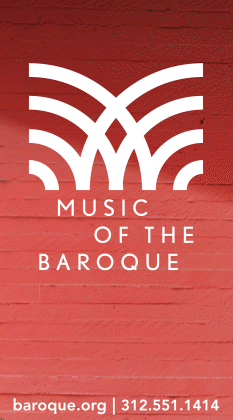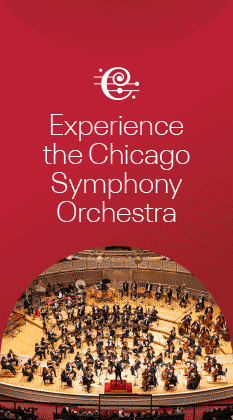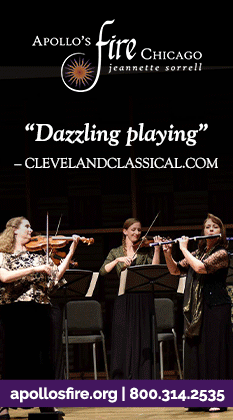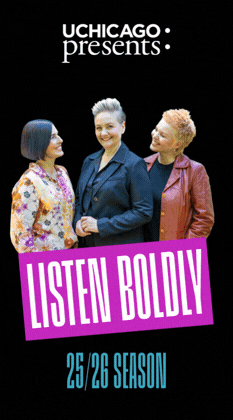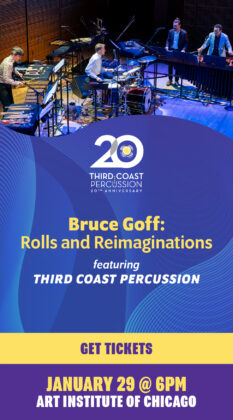MusicNOW begins the Montgomery era with a fresh and eclectic mix
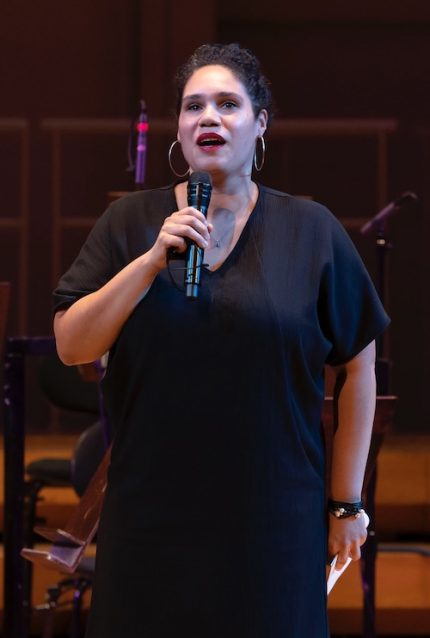
MusicNOW opened its 2021-22 season Monday evening at Symphony Center with a revealing road map of the unconventional, wildly eclectic directions in which Mead composer-in-residence Jessie Montgomery plans to take the Chicago Symphony Orchestra’s invaluable contemporary classical series.
The recent appointment of the 39-year-old New Yorker to a three-season residency signaled a welcome institutional commitment to stepping up diversity and inclusion in its overall programming—not to mention presenting music and musicians that represent the creative vitality of today’s Chicago, in all its manifestations. If that music and those musicians help open the center’s hallowed halls, not to mention its roster, to a broader cross-section of the community, so much the better for everyone.
One took Montgomery’s initial concert as curator and program host as an indicator she’s perfectly willing to broaden MusicNOW programming into new-music areas that don’t necessarily fall into lockstep with the ideologically correct parrot-cries of the moment. Not everything was an absolute winner, but there was enough stylistic variety, not to mention performer virtuosity, to engage ear and mind.
“Homecoming” was the title of a program—“our friends and family edition,” as she called it—holding five works by composers with pronounced ties to the city, including Chicago natives Elijah Daniel Smith and Ted Hearne, and Montgomery herself, with her vocal works “Loisaida, My Love”and Lunar Songs. The instrumental pieces elicited clean, clear and energized readings from ensembles of CSO members and guests. Michael Lewanski led the two large-ensemble works, Smith’s Scions of an Atlas and Hearne’s Authority, with his usual insight and expertise, no mean feat given the compositional rigors of both pieces.
The Smith opus, a CSO commission receiving its world premiere, represents what the composer in his introductory remarks called his “weird take” on the concerto form, the baroque concerto grosso in particular.
Scions of an Atlas trades on long-held drones, waves of rhythmically twitchy patterns, piquant woodwind multi-phonics and unconventional tunings in which the music oozes in and around given pitches. (The score carries such markings as “Building Towards Chaos” and “Go Nuts”.) No formal elements draw obvious parallels with baroque antecedents, although one’s ear is caught by the coloristic imagination behind such moments as the sputtering winds over the dry rattle of bongo drums that launch the 12-minute piece. If Scions of an Atlas didn’t quite hang together on first hearing, Smith, who is pursuing a doctorate in composition at Princeton, is a promising voice whose musical development will merit close attention.
Next up was soprano Whitney Morrison, a Chicago native and recent alumna of Lyric Opera’s Ryan Opera Center, who brought a rich voice, wide vocal compass and deeply felt expression to the Montgomery songs.
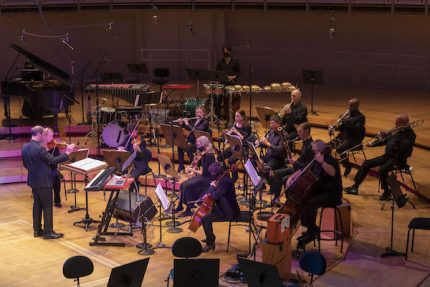
Scions of an Atlas Monday night. Photo: Todd Rosenberg
“Loisaida, My Love” (text by the Puerto Rican-born poet Bimbo Rivas) for voice and cello, is an impassioned homage to the composer’s upbringing on the Lower East Side of Manhattan. Cellist Katinka Kleijn provided the atmospheric undercurrent to Morrison’s big-hearted delivery (in sung and spoken Spanish and English).
Montgomery writes beautifully and well for the voice, a lyrical gift further evident in her mini-cycle Lunar Songs (texts by the poet and writer J. Mae Barizo), commissioned by ASCAP for the Leonard Bernstein centenary in 2019. No attentive ear could have failed to catch the sly references to the great Lenny’s inimitable musical persona in these attractive, jazzy-bluesy miniatures.
Visual art—in this case, Whitfield Lovell’s portraits of individual African Americans posed with everyday objects— form the inspiration to the Haitian-American flutist and composer Nathalie Joachim’s woodwind quintet Seen (2021).
Each member of the quintet was given a movement in which to display his or her quasi-soloistic talents. Joachim’s idiom is conservatively tonal, elegantly crafted in a manner reminiscent of the best French wind quintets of the last century, yet not without distinctive personal touches. An all-star ensemble consisting of flutist Emma Gerstein, oboist Anna Bach, clarinetist John Bruce Yeh, bassoonist Keith Buncke and horn player David Griffin did itself, and this highly attractive music, proud.
The concert concluded with Hearne’s Authority (revised 2021), in its first local hearing since its dedicatee Ensemble Dal Niente’s world premiere here in 2019.
An audacious explosion of in-your-face energy and rhythmic exuberance for 11 players and sometimes non-conducting conductor, the piece works additively, as differing instrumental layers are overlaid atop other instrumental layers, creating a sometimes dense clockwork of musics tugging at each other in different tempos, rhythms and the like. A throbbing harp and electric guitar figure at the beginning sets a kind of motivic template for what is to follow, and a cheeky fillip of electronic keyboard ties a bow on the piece. Authority was great fun to listen to and sounded like great fun to play, as well.
Posted in Uncategorized
